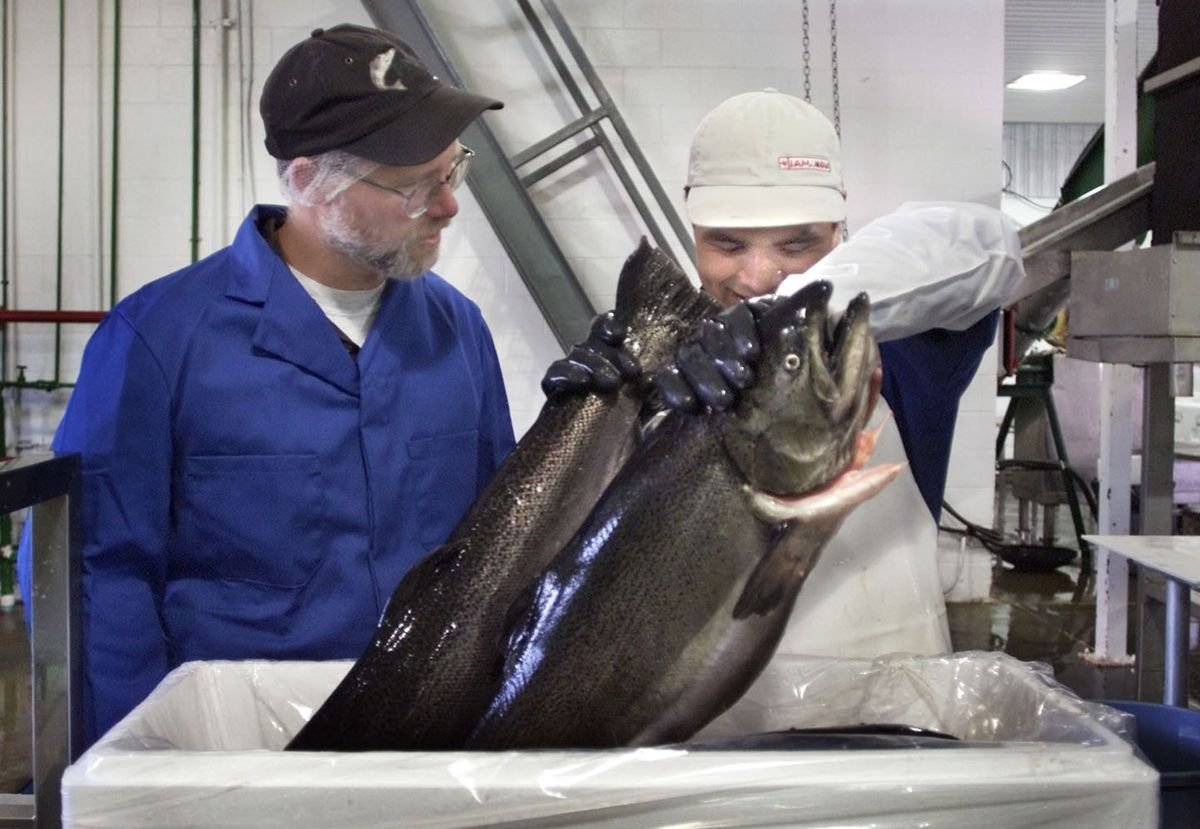[ad_1]
“The Dangers of Shutting Down Salmon Farms: How Loss of Jobs and Damage to the Environment Could Impact Our Future”
Activists with diverse vested interests are determined to shut down aquaculture in Canada. JOHN LEHMANN/The Globe and Mail
Ned Bell is a chef and sustainable seafood educator. Stefanie Colombo is a professor at Dalhousie University. David Dzisiak is Botaneco’s Chief Operating Officer. Larry Johnson is Co-Chair of the Canadian Aquaculture Industry Alliance Indigenous Partners Network. Ian Roberts is Chair of the Canadian Aquaculture Industry Alliance. Mary Robinson is President of the Canadian Federation of Agriculture. Dallas Smith is spokesman for the Coalition of First Nations for Finfish Stewardship.
Salmon is the most popular seafood choice for North Americans today, and much of it comes from aquaculture. It is also one of the proteins with the lowest carbon footprint available. Salmon farmers have been listed in major international sustainability indices as the world’s most sustainable large-scale producers of animal proteins. An independent index, the UK-based Coller FAIRR Index, listed salmon farmers as seven of the 10 most sustainable in November 2022, with two companies operating in Canada ranking first and second globally.
But as the rest of the world ramps up aquaculture production, campaigners with diverse vested interests have been determined to shut down aquaculture in Canada for the past 20 years. Some activists work with zero-sum outcomes approaches: demanding extreme and idealistic achievements, such as zero environmental impact—which is impossible in human affairs—or ceasing economic activity.
Unfortunately, governments have responded to these voices. Just as an example, recent federal and provincial decisions threaten to shut down 20,000 tons of BC farmed salmon production – historical peak production in the province is about 80,000 tons – which would result in a sharp drop in salmon available for Canadian consumer exports to the United States US market. This equates to 120 million salmon meals. This production is largely replaced by Chilean and Norwegian salmon farming. This has a significant negative impact on CO2 emissions.
A simple and conservative calculation of the CO2 emissions from air freight that would result from replacing BC farmed salmon with Chilean and Norwegian salmon equates to more than 160,000 tons. That corresponds to 35,000 more cars on the road.
These are negative and unaddressed consequences of actions not based on peer-reviewed science that threaten rare and valuable jobs in coastal and indigenous communities, increase the cost of salmon to consumers, and fail to consider the full sustainability picture. These measures would reduce the supply of fresh and healthy salmon produced using the world’s most sustainable methods; this at a time when the World Health Organization and the Canadian Dietary Guide are recommending eating more fish to counter Canadian diets that are deficient in critical oils and fatty acids — found in abundance in farmed salmon — that help reduce heart disease and provide proper neurological support support infant development.
What we need instead – and what will actually have a positive impact – is intelligent collaboration aimed at making our salmon production systems better and better. We need environmental groups willing to push, but also work with industry and committed First Nations to improve performance while keeping full sustainability and the global carbon picture in mind.
In December 2022, Canada’s salmon aquaculture sector, with support from Agriculture and Agri-Food Canada, released its sustainability commitments to Canadians to demonstrate its commitment to continuous improvement. An external advisory panel of experts including scientists, food experts, indigenous leaders, retailers and some signers of this article provided feedback and guidance. Other food sectors have undertaken similar commitment exercises. This is the necessary path forward: collaborative and incremental improvement of Canada’s farmed salmon production that is socially, economically and environmentally sustainable.
Salmon farming can be part of the answer to Canada’s ambitious goals on other fronts – such as job opportunities, improved human health and wealth, and reduced carbon emissions. It’s time to join our collective efforts to grow more food smarter in Canada, not less.
[ad_2]
Don’t miss interesting posts on Famousbio










